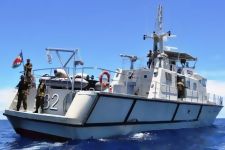
March 2013
The United States Maritime Administration has warned merchant vessels to be on the lookout for attacks by extremist groups in the Arabian sea. On March 13th, the Administration issued a warning saying that “elevated regional tensions have increased the risk of potential maritime attacks conducted by extremists.”
This statement also issued some guidance to vessels traveling the Gulf of Oman, the north Arabian Sea, the Gulf of Aden and the Mandab Strait.
The advice is a standard best practice that many merchant vessels already use to ward off pirate attacks: “vessels at anchor, operating in restricted maneuvering environments or at slow speeds be especially vigilant and report suspicious activity”.
Ships are most vulnerable when they are at anchor or traveling at low speeds, making it far easier for small pirate skiffs to board them.
The director of the International Maritime Bureau (IMB), Pottengal Mukundan concurred with the Administrations statement, explaining that there is usually strong intelligence behind the decision to issue such an announcement.
The Strait of Hormuz, between the Arabian Sea and the Persian Gulf, is an area where ships need to be particularly vigilant. While Iran has consistently threatened to block the strait, there are numerous other threats, including terrorism, mines and hijacking.
A UAE oil tanker was hijacked by Somali Pirates in the area in 2011, but the crew was able to be freed by UAE special forces and help from the U.S. Fifth Fleet.
Private security firms have warned ships to be alert when anchored off Yemen, Saalah, Fujairah, Doha, Muscat, Aden and Djibouti in particular. When ships are anchored close to port, they are common devoid of armed security guards.
Formerly, attacks were uncommon close to ports, and many countries have restrictions on ships bringing weapons into their territorial waters. So the armed guards depart in international waters, leaving the ships open to a small window for attack.
At this critical juncture, the ship’s crews must remain particularly vigilant, especially on larger ships which are less maneuverable and essentially sitting ducks for terrorists.
There have been vessel based improvised explosive device (VBIED) attacks in the past in the region. In 2000, al-Qaeda bombed the USS Cole in Yemen, and in the following decade there were attacks in the Gulf of Aden and the Strait of Hormuz.
Attacks on oil tankers are particularly concerning because of the potential environmental effects an explosion of a tanker could have, in addition to the loss of human life. In addition, there could be far-reaching effects on the confidence of the shipping industry in the region. This would have a negative impact on all coastal economies in the area surrounding the Indian Ocean.
While advising ships on best practices is important to improving maritime security, it must be accompanied by proportional action by international task-forces, and increased maritime domain awareness of coast nations.
Maritime security is a complex affair, and must be handled with a multi-faceted approach.